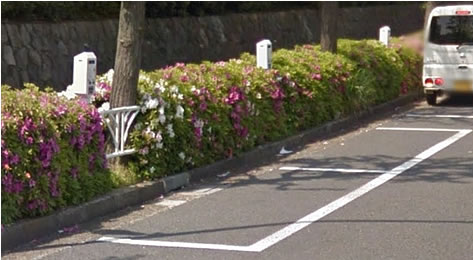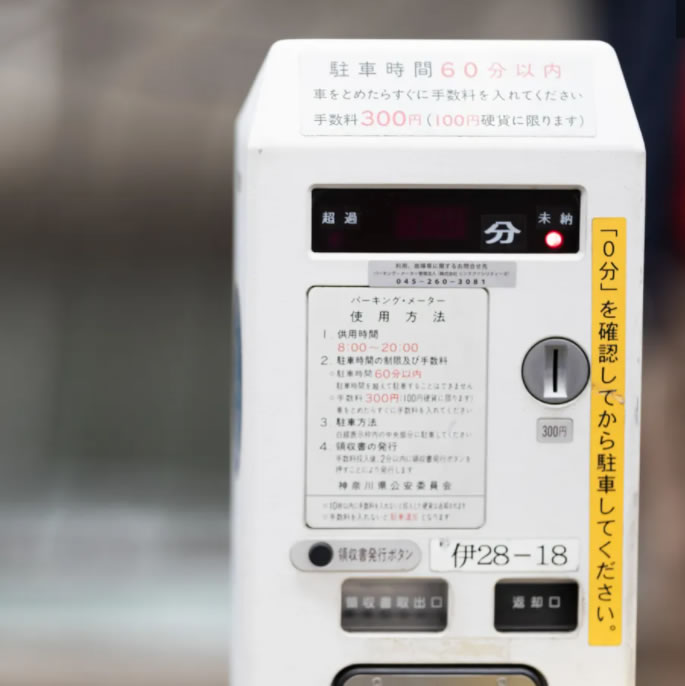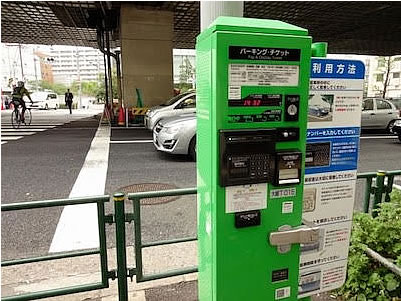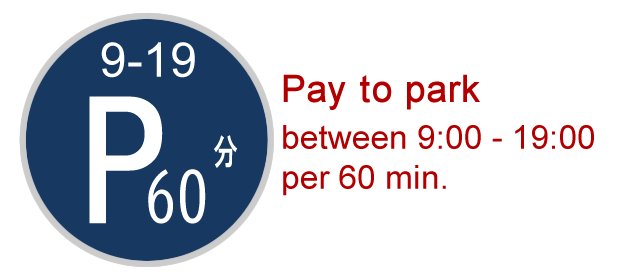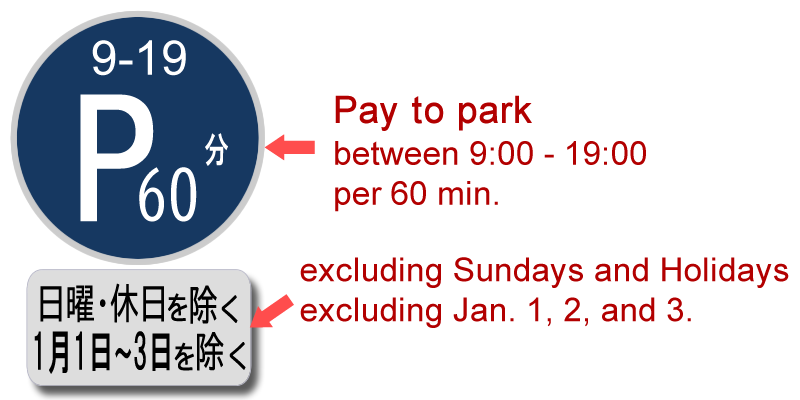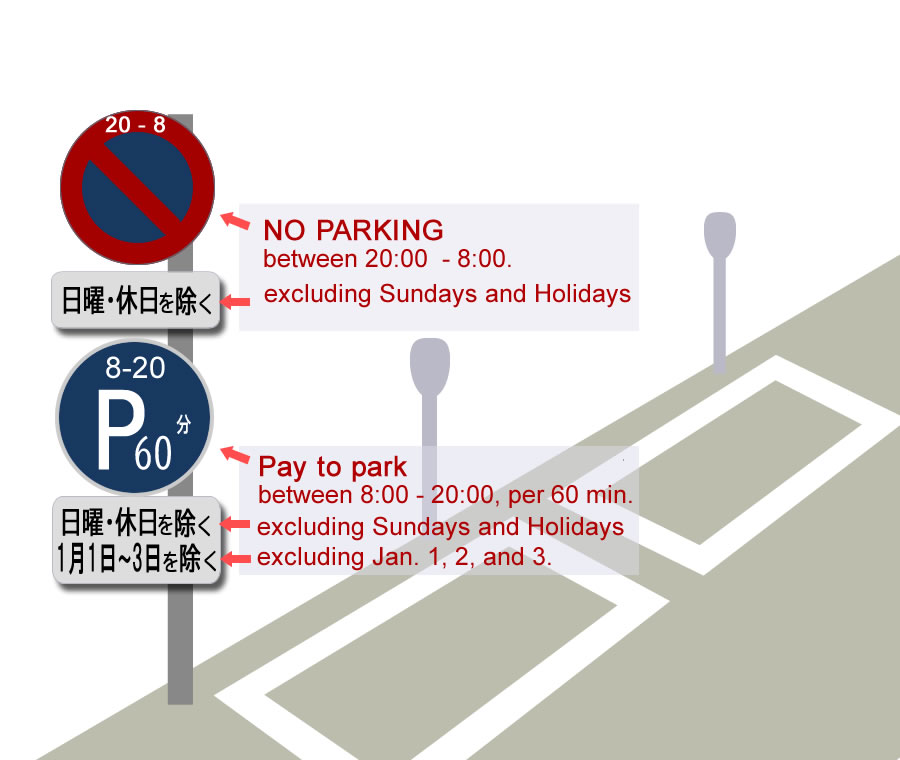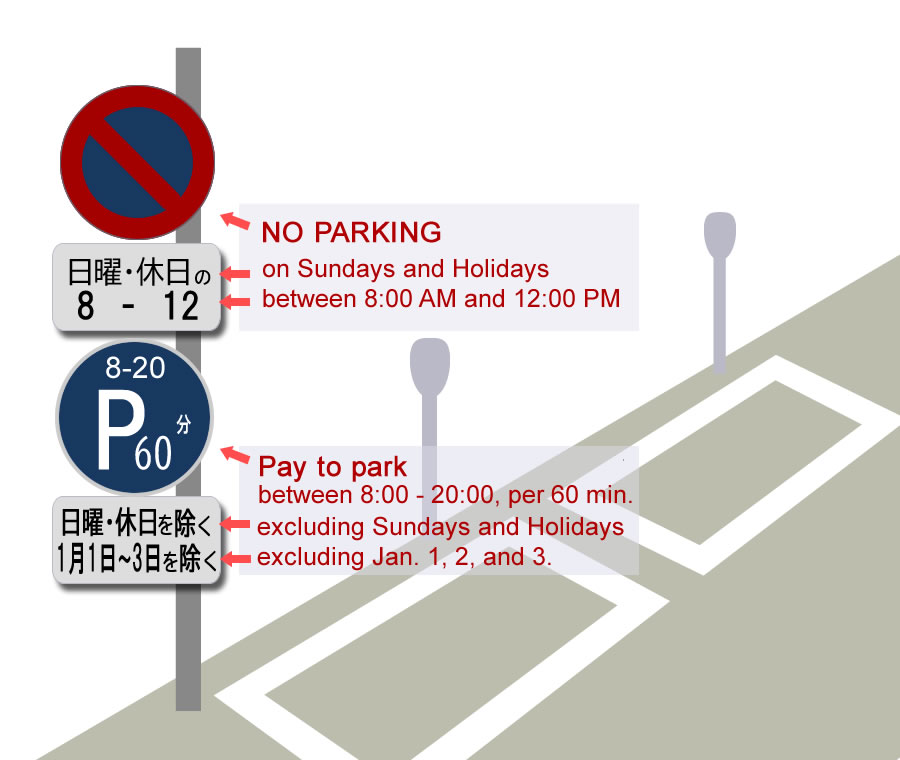On-street parking is convenient in need of parking a car for a little while, meeting someone, loading luggage at a train station, etc. Indeed, you can park your vehicle right on the street there and move out smoothly, which is another advantage of on-street parking. However, parking on the street is permitted only for temporary use, and the users are to follow the regulations according to traffic law. In addition, the on-street parking spaces are not available in all districts of Tokyo, so you need to know in which area the parking is available and how to use them without violation of the law.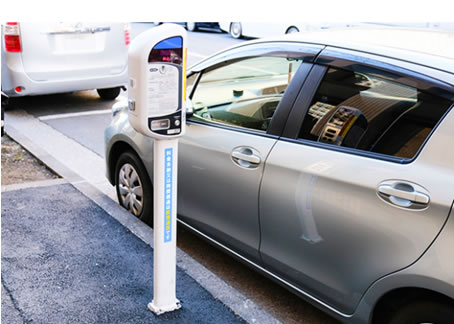
What is an on-street parking space?
On-street parking (路駐パーキング Rochuu parking) is a time-limited parking zone on the street, where parking is permitted under certain conditions according to traffic laws. The parking spaces are indicated with white lines along the street side, has a fee collection machine (parking meter) standing beside them. As the machine can help find the parking spaces, some people call the parking space “Parking meter” in Japanese.
If you park your vehicle within the lined parking space and pay a fee, you are legally allowed to park within a limited time. In Tokyo, the maximum time of parking allowed is 60 minutes. (20 or 40 min. at some places) The fee is 300 JP Yen collected there in advance.
Types and usage of on-street parking spaces
Currently, there are two types of fee-collection machines provided at the parking space – a parking meter and a ticket validation machine, and here you find the basic usage of each and some tips.
For more detailed, informative, and easy-to-understand guidance, it is advisable to see Metropolitan Police Department’s websites, available in English, Chinese (Simplified and Traditional), Korean, and Spanish.
Guide to parking in TOKYO by Metropolitan Police Department
https://www.keishicho.metro.tokyo.lg.jp/multilingual/english/traffic_safety/parking.html
Parking meter system
This parking space has a parking meter that is a fee collection machine. You probably see this type of parking space more often within central Tokyo. There are two different models are in operation, old and new, and the usage of both models is basically the same and accepts only 100 Yen coins for fees. One difference is that the new model has guidance in English.
(How to use)
Getting In
1. Park your vehicle within the lined parking space.
Ensure that the parking meter shows “0 MINUTE” before parking your vehicle.
The vehicle must be parked within the lined space. It is not allowed to park a large vehicle over two lined spaces.
2. Check the parking meter detects your vehicle, then insert coins to pay the fee.
The parking meter accepts only 100 Yen coins.
If you need a receipt, press the button “領収書発行ボタン” to get it issued.
Getting Out
Move out your vehicle from the parking space within the limited time.
You cannot keep parking over the time limit, or it will be a traffic violation. No extension is allowed.
Ticket validation system
A ticket machine, usually green, is provided on the sidewalk near the parking spaces. In the case of the parking ticket system, you need to park your vehicle first, then go to the ticket machine to buy a ticket, which serves as proof of parking permission.
(How to use)
Getting In
1. Park your vehicle within the lined space.
The vehicle must be parked within the lined space. It is not allowed to park a large vehicle over two lined spaces.
2. Go to the ticket machine on the sidewalk and pay a fee to get a ticket.
The ticket machine accepts 1000 Yen bills, 500- and 100-Yen coins.
The validation ticket is partly being a receipt.
3. Go back to your vehicle and place the ticket inside (at the front screen). The ticket must be seen from outside to avoid being a parking violation.
Getting Out
Move out your vehicle from the parking space within the limited time.
You cannot keep parking over the time limit, or it will be a traffic violation. No extension is allowed.
How to find an on-street parking space
On-street parking spaces are mostly found in the central part of Tokyo, a very concentrated part of areas such as business districts and downtown. It is almost no chance to find it with a guess while driving around. If you plan to use the parking space, check the location beforehand.
To find the on-street parking spaces, see the location map by Metropolitan Police Department available online in English, Chinese (Simplified/ Traditional), Korean and Spanish. If you enlarge the map and click on the blue or green line, it shows detailed information such as available hours. The location is marked with two different colored lines as it tells whether the parking space is available on Sundays/holidays or not.
Location map of time-limited parking zone
https://parkingmeter.jp/en/parkingmap
Available time to park and the regulations
In most cases, on-street parking spaces (i.e., a time-limited parking zone) are available to use during a specific time only. For example, if the zone’s traffic sign “P” has 9-19, it indicates the parking meter at the zone is in operation between 9:00 and 19:00, and parking is permitted by paying a fee during the time, for up to 60 minutes.
Also, an auxiliary sign may add conditions such as exclusion days, depending on the location. In the example-2 below, the sign says that the paid parking zone is available from 9:00 to 19:00 on days other than Sundays, holidays (national holidays), and January 1-3.
What if parking during the unavailable time? Any exemptions?
Using parking space properly requires knowing what if you park outside of the designated times and days. Otherwise, you may get a parking ticket due to negligence. In fact, learning about the conditions will give you a chance to legally park your vehicle without being charged at the time-limited parking zone.
Remember, some zones have two traffic signs together- a parking sign and a no-parking sign, where you should be careful not to overlook the “no-parking sign”. As shown in the example-3 below, in the case of having both no-parking and time-limited parking signs, parking outside of the permitted times (during the parking space is not available) will result in a parking violation.
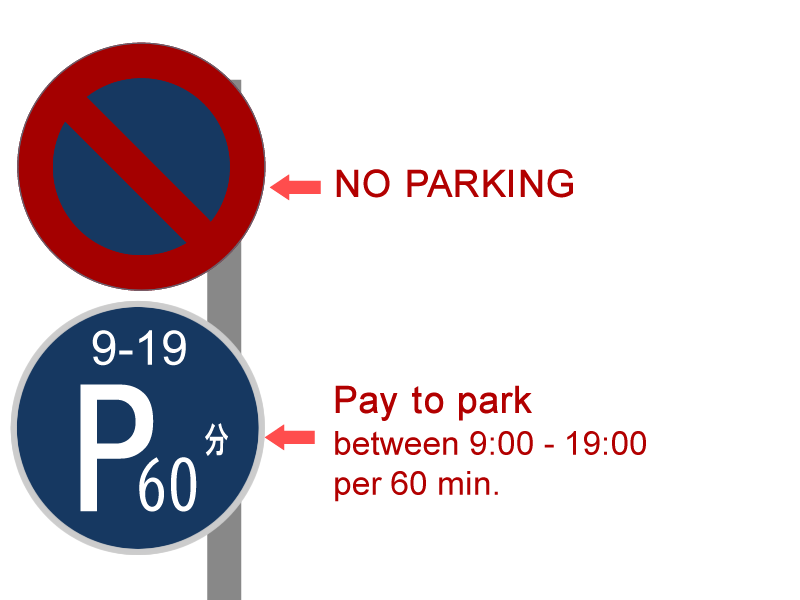
Example-3: Parking between 19:00 and 9:00 will be a violation. Paid parking is permitted during 9:00-19:00.
One more thing to keep in mind here is that some of the signs have other conditions indicated beneath, which will allow you to park without violation. Moreover, you can park without being charged a fee while the parking meter is not in operation, as long as it is not during the hours specified by the sign of the time-limited parking zone.
For example, in example-4 below, the no-parking sign has an auxiliary sign specifying an additional condition, “Except Sundays and holidays,” which allows you to park your vehicle on those days without being a violation. Also, the sign of the time-limited parking zone has an auxiliary sign that stipulates, “Between 20:00 and 8:00 the next day, excluding Sundays, holidays, and January 1-3,” and this means that you can legally park your car without a fee at the on-street parking space on Sundays and holidays (national holidays). The parking zones with signs of these conditions are often found near public facilities and parks a little far off the city center.
However, it would be best to be very careful when reading the signs. The signs indicating such additional regulations can sometimes confuse you, resulting in a violation in mistake.
Example-5 above depicts the signs tending to make confusion, often seen in narrow streets with detailed traffic regulations, such as office districts and back streets in downtown areas. To read the sign correctly, be careful not to mix up the Japanese letter “の (on)” and “除く(excluding)” in the line “Sundays and holidays.” in the auxiliary signs, as they have opposite meanings.
The two signs in the Example-5 prescribe;
Parking is prohibited in this zone between 8:00 AM and noon on Sundays and holidays (national holidays).
And,
Parking in this zone is permitted by paying a fee between 8:00 AM and 8:00 PM, excluding on Sundays, holidays (national holidays), and January 1-3. For up to 60 minutes.
In other words;
Parking is permitted on Sundays and holidays (national holidays) from midnight to 8:00 AM and from 12:00 PM to midnight without being charged a fee.
And,
On weekdays and Saturdays, from 21:00 to 7:00 the next day, you can park your vehicle at the zone without being charged a fee.
Still, other regulations remain to follow in terms of parking, such as no parking is permitted near intersections and fire-hydrants within 5m distance. It is strongly recommended that you read through Japan’s traffic law and make a careful decision before using an on-street parking space. If you find the parking conditions confusing due to a language problem, may consider that on-street parking spaces are basically used with a fee.
Information
Traffic Rules by Metropolitan Police Department
https://www.keishicho.metro.tokyo.lg.jp/multilingual/english/index.html
道路交通法・東京都公安委員会規則
Road traffic law, and Regulations by Tokyo Metropolitan Public Safety Commission
https://www.keishicho.metro.tokyo.lg.jp/kotsu/jikoboshi/bicycle/menu/ho_kisei.html

